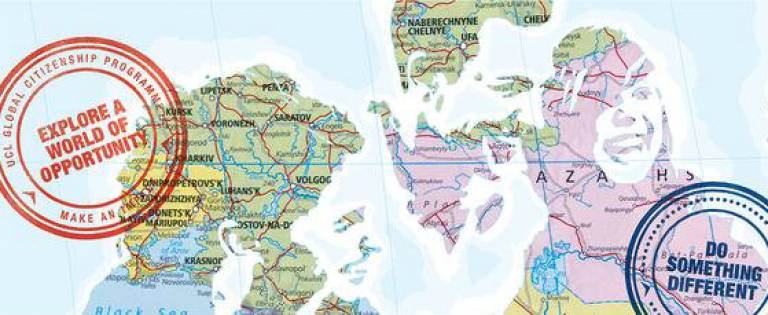Wanted: Students to help bring about social justice in Africa, London and everywhere else
28 April 2016
"We live in a city where there is so much inequality and where globalisation is a force for bad, as well as sometimes for good, and yet we can all make a positive change - we just need to know how," says Dr Alexandre Apsan Frediani from UCL's Development Planning Unit at The Bartlett.

Fortunately, this summer UCL students can learn for free how to make a positive change.
This year, the university's flagship Global Citizenship Programme, a two-week non-credit bearing course that takes place after exams, features two options that will teach you how to bring about social justice in London, Tanzania or wherever you happen to be - and there are still some places available if you register now.
Global Alliances for Local Change
First and second-year undergraduates can sign up for the Global Alliances for Local Change option which centres around a role play scenario based on real life. Students are told that they are in a slum dwelling under threat of displacement in Dar Es Salaam, Tanzania. They will play the part of residents about to lose their homes, charity workers, local or central politicians or the municipal authorities. By the end of the two weeks, all sides must have come up with a Memorandum of Understanding - an agreement between several parties.
During the two weeks, students develop their negotiation and influencing tactics and are made to face other points of view - a skill crucial in today's workplace. They also have the chance to learn Swahili - the language spoken in Dar Es Salaam.
Dr Frediani, academic director of the Global Alliance for Local Change option, says that for some students, the two weeks can be "life-changing" and set their career in a different direction to the one they had anticipated. Often they consider international development or development planning, among many other careers, as a result. "The students start thinking of ways that they can make a change," he says.
(Un)Urban option
Meanwhile, the (Un)Urban option of the Global Citizenship Programme also has places available for those who register quickly. It is open to first and second-year undergraduates who will spend their two weeks trying to solve a challenge set by a charity or a social enterprise while on location in Hackney Wick, East London. One challenge, for example, might be: "How do you improve local people's wellbeing through increasing access to the Queen Elizabeth Olympic Park?"
The students are taught the fundamentals of Human-Centred Design, a way of solving problems by involving the human perspective. They are encouraged to produce an e-book in groups to show off their fieldwork - something they may find useful to talk about in job interviews.
Hannah Sender, programme manager of the (Un)Urban option, says, "Students do get to learn about innovative approaches like Human-Centred Design, but for me the real draw for this option is that you get to work with local organisations to help them solve a problem and you do it on location. This is not make-believe, this is real-world stuff. This is an amazing opportunity to make an impact on an organisation."
Students can register now by visiting the programme website and can find out about the other options on the Global Citizenship Programme. The programme will take place from 31 May to 10 June 2016. There are options for undergraduates and postgraduate taught students and everyone, no matter what they are studying, is eligible.
Office of the Vice-Provost (Education & Student Affairs)
 Close
Close

